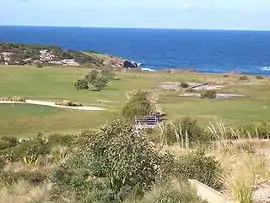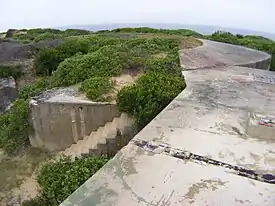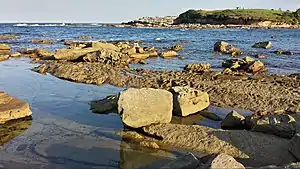Little Bay, New South Wales
Little Bay is a suburb in the Eastern Suburbs of Sydney, in the state of New South Wales, Australia. Little Bay is located 14 kilometres south-east of the Sydney central business district and is part of the local government area of the City of Randwick.
| Little Bay Sydney, New South Wales | |||||||||||||||
|---|---|---|---|---|---|---|---|---|---|---|---|---|---|---|---|
 The Coast Golf Course, Little Bay | |||||||||||||||
| Population | 2,937 (2011 census)[1] | ||||||||||||||
| Postcode(s) | 2036 | ||||||||||||||
| Elevation | 39 m (128 ft) | ||||||||||||||
| Location | 14 km (9 mi) south-east of Sydney CBD | ||||||||||||||
| LGA(s) | City of Randwick | ||||||||||||||
| State electorate(s) | Maroubra | ||||||||||||||
| Federal division(s) | Kingsford Smith | ||||||||||||||
| |||||||||||||||

Little Bay is a coastal suburb, to the north of Botany Bay. The suburb takes its name from the geographical formation called Little Bay, which also features a small beach. The Prince Henry Hospital was a famous landmark once located at Little Bay.
History
The Little Bay area was first used as a sanitation camp during Sydney's smallpox outbreak in 1881–82, to isolate the healthy contacts of sufferers of the disease. At first, a "tent city" was established on the beach, but as well the government decided to build a permanent hospital here to treat infectious diseases. Little Bay was an ideal location because it was isolated from settlements but still close enough to Sydney. The Coast Hospital was particularly valuable during the bubonic plague in Sydney of 1900 and then again when soldiers returning from Europe brought the influenza virus back in 1919. The Coast Hospital became Prince Henry Hospital in 1934. In 2001 services were transferred to Prince of Wales Hospital, Sydney and the hospital site became available for residential use.[2]
There are still nineteen heritage listed buildings on site from the Coast/Prince Henry days.
Two landmarks still remain from the hospital days. One is the Coast Cemetery, situated south of Little Bay. Some two thousand five hundred plus people were buried there, with the oldest graves being located further south, towards Cape Banks. The cemetery was taken over by the National Parks and Wildlife Service of New South Wales when the Botany Bay National Park was created. Most of the graves are now under vegetation to protect them.
Another landmark is the Interdenominational War Memorial Chapel, which overlooks Little Bay. It was destroyed by fire in October 1981, but was subsequently rebuilt in 1982. Outside the chapel there is an array of memorial plaques dedicated to former staff of the hospital.
Little Bay was originally called Yarra Junction but mail would end up in Melbourne (Vic) so the residents asked for the suburb's name to be changed. This was granted and changed to Phillip Bay Heights (Phillip Bay is a suburb located between Little Bay and Botany Bay) but as everyone called the area Little Bay this was the name that was eventually officially adopted. During the 1950s, much of the land was provided to returned servicemen via War Ballots.
In 1969, the international artists Christo and Jeanne-Claude created the world's largest sculpture at Little Bay called: "Wrapped Coast – One Million Square Feet, Little Bay, Sydney, Australia". Many Australian artists and students volunteered to assist them wrapping 2.4 kilometres of coastline, which was 46 to 244 metres wide, up to 26 metres high at the northern cliffs, and at sea level at the southern sandy beach. It introduced a radical work of art which at the time was controversial and polarised the community. It marked the beginning of a new chapter of contemporary art in Australia and today is considered a triumphant project. Christo and Jeanne-Claude went on to wrap cars, galleries, islands, and even the Reichstag building in Germany.[3]
Heritage listings
Little Bay has a number of heritage-listed sites, including:
- 1430 Anzac Parade: Prince Henry Site[4]
Little Bay Beach

In the stretch of coastline south of Sydney Harbour (Port Jackson), Little Bay Beach is the last significant sand beach before Botany Bay. Little Bay took its name from the obvious comparison to nearby Long Bay at Malabar. On the evening of 3 December 1797, George Bass, at the commencement of his first major voyage of discovery in the waters of southern Australia, anchored there in his open whaleboat with a crew of six,[5] referring to it in his journal as Little Harbour.
Little Bay beach is semi-circular in shape and enclosed by headlands to the south and north. Its narrow entrance provides significant shelter from prevailing sea conditions.
A ring-of-rocks bathing pool known as Little Bay Rock Pool or Little Bay Baths was created from beach rocks at the southern end of the beach in the early 1900s to provide safe shark-free bathing for nurses resident nearby at the Coast Hospital. The pool is still partially intact.
Little Bay is not a surf beach and does not have an undertow or "rip" unless there is a strong sea from the south or south-east running into the bay. The beach is not patrolled by lifesavers. However surf lifesavers and the Westpac Life Saver Rescue Helicopter Service attend to incidents. Rock fishing is very popular along the rocky coastline to the north and south of Little Bay, but it is also very dangerous with deaths occurring occasionally. Information on water safety at Little Bay is provided on the Little Bay Beach web site.[6]
In February 2022, a 35-year-old expatriate British diving instructor was killed by a white shark while swimming off Little Bay Beach. He was the first person killed by a shark in Sydney coastal waters since the death of Marcia Hathaway in 1963.[7]
Pollution
As the population of Sydney grew, the beaches south of the Malabar sewage treatment plant such as Little Bay, became increasingly polluted. By the 1980s, the water was brown and fat was deposited on the sand and rocks, making them slimy and smelly. After the Malabar Deep Ocean Outfall commenced operation in 1990, the beaches to the south became significantly cleaner within a very short period of time.[8] Today, Little Bay is consistently one of the cleanest beaches in Sydney, in terms of water clarity and bacteria counts.[9]
 Restored weatherboard building on former grounds of Prince Henry
Restored weatherboard building on former grounds of Prince Henry War Memorial Chapel overlooking Little Bay
War Memorial Chapel overlooking Little Bay Memorial plaques outside chapel
Memorial plaques outside chapel Coast Cemetery
Coast Cemetery
Landmarks
The north headland of Botany Bay (Henry Head) has a number of features, including two old gun emplacements at Fort Banks, and an unattended lighthouse and the wreck of the SS Minmi[10] on what is called Pussycat Island. The older of the gun emplacements, known as the Henry Head Battery was originally built just after the completion of Bare Island to provide additional coverage of the entrance to Botany Bay.
- Former Prince Henry Hospital
- Spinal Cord Injuries Australia[11]
- Aboriginal Health College[12]
- Prince Henry Development Project[13]
- Little Bay Weather Station[14]
Notable residents
- Russell Fairfax, rugby league player[15]
- Greg Inglis, rugby league player[16]
- Anthony Maroon, radio personality
- Tony Rafty, cartoonist[17]
- Jane Saville, race walker[18]
- Fiona Stanley, paediatrician and 2003 Australian of the Year[19]
- David Warner, Test cricketer[20]
- Nathan Williamson, broadcaster/journalist
Street names
Many street names in Little Bay were derived from Aboriginal words or eminent people, especially those associated with medicine through the presence of the former Prince Henry Hospital.
| Name | Derivation |
| Abbe Receveur Place | Named after Louis Receveur, a Franciscan friar and scientist who sailed with La Perouse |
| Alkoo Avenue | Aboriginal word meaning "visitor" |
| Anzac Parade | Named to commemorate the occasion when the First Australian Imperial Force camped at Kensington Racecourse |
| Bega Avenue | Aboriginal word meaning "large camping ground" |
| Binda Crescent | Aboriginal word meaning "deep water" |
| Brodie Avenue | Named after surgeon Sir Benjamin Collins Brodie |
| Budd Avenue | Named after an early female resident |
| Bunnerong Road | Aboriginal word meaning "sleeping lizard" |
| Clonard Way | |
| Coast Hospital Road | Named after The Coast Hospital, the original name for Prince Henry Hospital |
| Cove Circuit | |
| Curie Street | Named after Pierre and Marie Curie |
| Darwin Avenue | Named after naturalist Charles Darwin |
| Dawes Avenue | Named after Lieutenant William Dawes who was on the First Fleet |
| Dwyer Avenue | Named after Matt Dwyer, former Mayor of Randwick |
| Esperance Close | |
| Ewing Avenue | Named after pathologist James Ewing |
| Fleming Street | Named after bacteriologist Alexander Fleming |
| Florey Crescent | Named after pharmacologist and pathologist Howard Florey |
| Gipps Avenue | Named after Sir George Gipps, former Governor of NSW |
| Goora Street | Aboriginal word meaning "long" or "tall" |
| Grose Street | Named after Francis Grose, first Lieutenant-Governor of NSW |
| Gubbuteh Road | Aboriginal word meaning "ochre", named after local ochre deposits |
| Gull Street | Named after physician Sir William Gull |
| Harvey Street | Named after physician William Harvey |
| Jenner Street | Named after surgeon Edward Jenner |
| Jennifer Street | |
| Lister Avenue | Named after surgeon Joseph Lister |
| Little Bay Road | Named after nearby Little Bay |
| Marconi Place | Named after Guglielmo Marconi, Italian physicist who developed the wireless telegraph |
| Mayo Street | Named after physician William Worrall Mayo |
| McMaster Place | Named after Jean McMaster who established the Nurses' Training School at Prince Henry Hospital |
| Meyler Close | Named after Mary Meyler, first matron of Prince Henry Hospital |
| Millard Drive | Named after Dr Reginald Millard, medical superintendent at The Coast Hospital |
| Mirrabooka Crescent | Aboriginal word for the "Southern Cross" |
| Murra Murra Place | Aboriginal word meaning "sea mullet" |
| Newton Street | Named after Sir Isaac Newton |
| Noora Avenue | Aboriginal word meaning "camp" |
| Nurla Avenue | Aboriginal word meaning "plenty" |
| Pavilion Drive | Named after the pavilion wards at Prince Henry Hospital that allowed fresh air to circulate around infectious patients |
| Pine Avenue | Named because Norfolk Island pine trees were predominant in the grounds of Prince Henry Hospital |
| Reservoir Street | Named because there is a water reservoir nearby |
| Woomera Road | Aboriginal word – see woomera |
| Woonah Street |
Sources:
- "Historic street & place names". randwick.nsw.gov.au. 20 August 2014. Retrieved 9 November 2016.
- Graham, Susan. "Naming our streets and parks". princehenrycommunity.com.au. Retrieved 9 November 2016.
Transport
Little Bay is served by five bus services operated by Transdev John Holland:
| Route number | From | To | Service | Timetable |
| 390X | La Perouse | Bondi Junction railway station | Express | Route 390X timetable |
| 392 | Little Bay | Redfern railway station | Regular | Route 392 timetable |
| 392X | Little Bay | Museum railway station | Express | Route 392X timetable |
| 394X | La Perouse | Museum railway station | Express | Route 394X timetable |
| 399 | Little Bay | University of New South Wales | Regular | Route 399 timetable |
Sport and recreation
- St Michael's Golf Club[21]
- The Coast Golf Club[22]
- Surf Life Saving Sydney, Branch Office at 16 Murra Murra Place, Little Bay. Surf Life Saving Sydney
References
- Australian Bureau of Statistics (31 October 2012). "Little Bay (State Suburb)". 2011 Census QuickStats. Retrieved 20 April 2015.
- The Book of Sydney Suburbs, Compiled by Frances Pollon, Angus & Robertson Publishers, 1990, ISBN 0-207-14495-8, p.155
- McGregor, Adrian (27 October 2019). "From the Archives, 1969: Christo wraps Little Bay". The Sydney Morning Herald.
- "Prince Henry Site". New South Wales State Heritage Register. Department of Planning & Environment. H01651. Retrieved 18 May 2018.
 Text is licensed by State of New South Wales (Department of Planning and Environment) under CC-BY 4.0 licence.
Text is licensed by State of New South Wales (Department of Planning and Environment) under CC-BY 4.0 licence. - Estensen, Miriam The Life of George Bass: Surgeon and Sailor of the Enlightenment. Allen & Unwin, 2005 (hardcover ISBN 1-74114-130-3)
- "Water safety". 13 April 2013.
- "'Nicest, kindest human': Diving instructor killed in Sydney shark attack remembered". www.9news.com.au. Retrieved 18 February 2022.
- Weekly Southern Courier (newspaper) 30 October 1990
- "Beaches". NSW Environment, Energy and Science.
- "Michael McFadyen's Scuba Diving Web Site". www.michaelmcfadyenscuba.info.
- "SCIA | Home". SCIA.
- "Aboriginal Health College, Little Bay | The Dictionary of Sydney". dictionaryofsydney.org.
- PRINCE HENRY | at little bay Archived 28 August 2007 at the Wayback Machine
- Latest Coastal Weather Observations Little Bay
- Manly, Lucy (25 May 2019). "The incestuous world of Sydney rich kids". The Sydney Morning Herald.
- "Rabbitoh's legend Greg Inglis sells Coogee home after reducing price guide". www.propertyobserver.com.au. 2 June 2019.
- Tingle, Greg. "Tony Rafty: Caricaturist and Australian National Treasure". mediaman.com.au. Retrieved 11 September 2010.
- Levi, Joshua (26 August 2008). "Saville hangs up shoes". Archived from the original on 5 March 2011. Retrieved 11 September 2010.
- Bunbury, Bill (30 March 2008). "Encounter". abc.net.au. Retrieved 11 September 2010.
- Rothfield, Phil (1 December 2013). "RUMOUR MILL". The Sunday Telegraph. Retrieved 7 January 2014.
- Welcome to St. Michael's Golf Club
- The Coast Golf Club
External links
- Raelene Allen (2008). "Smallpox epidemic 1881". Dictionary of Sydney. Dictionary of Sydney Trust. Retrieved 5 October 2015. [CC-By-SA]